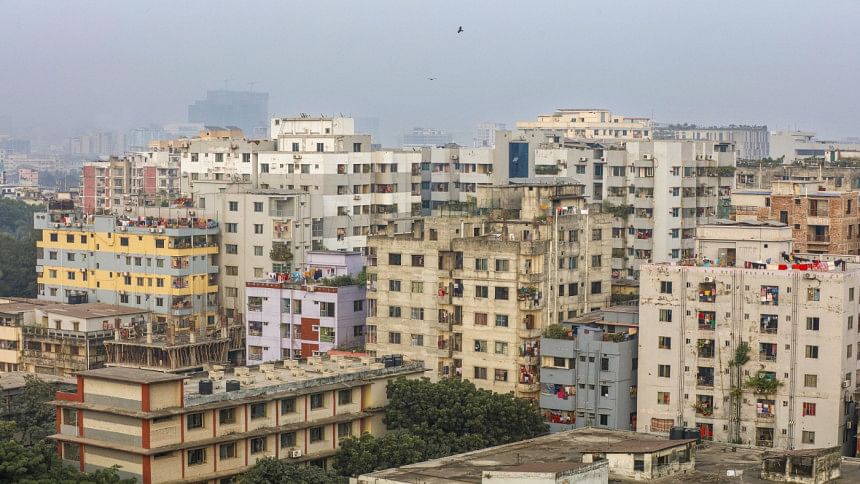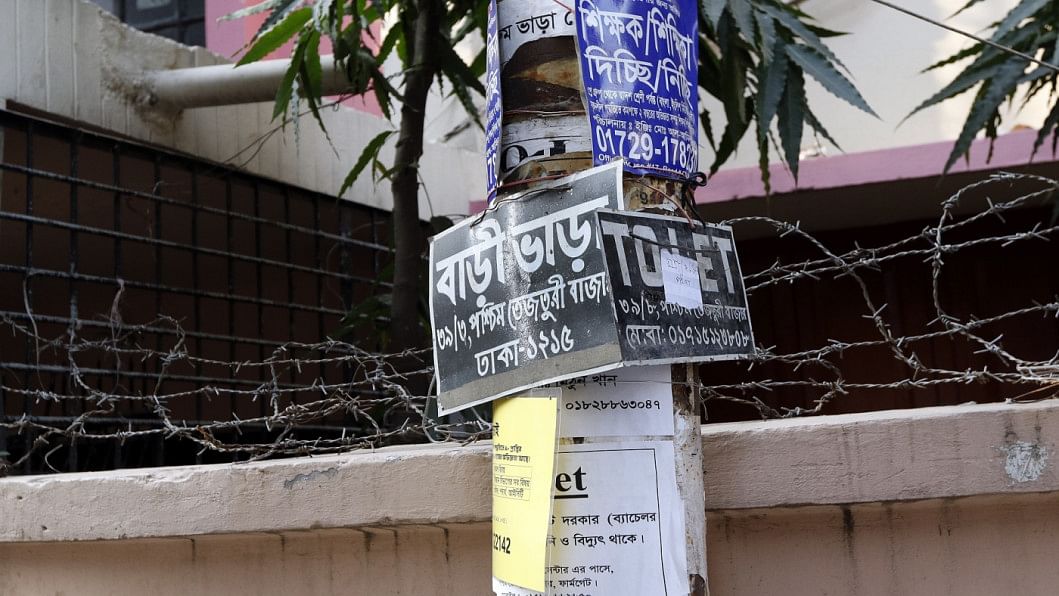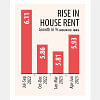Increase in house rent puts further burden on tenants

Hafizur Rahman works for a private company and was looking forward to an increment of Tk 1,500 in January, but at the turn of the year his house rent increased by Tk 2,000, leaving him instead facing a deficit of Tk 500.
Rahman is the breadwinner in his four-member household, including two children, one of whom is a fifth grader and another who was admitted to school in the just-concluded month of December.
The 35-year-old, who resides in Sangbadik Abashik Alaka in Mirpur 11, informed that he had already spent around Tk 13,000 to admit his children to school.
This month, he received a notice from his landowner that the house rent would be hiked by Tk 2,000, leaving him worrying about how to cope with it.
After discussing his financial health with family and close relatives, Rahman was left with no alternative but to move to a new home.
"Now I am searching for a two-room flat within the range of Tk 12,000-Tk 13,000 in the same area. If I can find one, it will be a great relief," he said.
Another individual, Jamal Hossain Raju, works at an IT firm in Banani and lives in Khilkhet with his wife and son.
Raju also said he received a notice about an increase in house rent from his landlord last month which, alongside sustained inflation, has made life difficult.
The Consumer Price Index in Bangladesh rose 9.02 percent in fiscal year 2022-23, portraying the highest average inflation rate in 12 years. That trend has continued in the current financial year of 2023-24, with inflation averaging 9.42 percent in November, figures from the Bangladesh Bureau of Statistics showed.
"The prices of daily essentials and other items have been going up day after day. Along with that, the increased house rent will pinch my wallet further," Raju said.
"I draw a monthly salary of Tk 32,000 and now I have to pay Tk 13,000 as rent from this month, up from Tk 11,500," he added.
The 32-year-old added that his company had already informed its employees that they would not be given any increment this year.
As he laid bare his plight, he questioned: "If half of my salary is spent on rent, how will I save money for the future?"
After analysing his options, Raju was also facing the same reality in the end.
"In such a situation, it is very tough for me to live in this rented flat with my family. I have to search for a relatively lower priced flat in the Uttara or Badda area," he said.
At present, Raju's wife is also seeking employment as a means to alleviate some of the financial pressure on her husband.
Like Rahman and Raju, there are thousands of people in Dhaka and other cities who are struggling against a common woe: a hike in house rent.
Speaking to 15 tenants in different areas of the capital, including Mirpur, Uttara, Shyamoli, Kalyanpur, Dhanmondi, Moghbazar and Mohammadpur, house owners increasing rent from the beginning of the new year appears to be a common trend, with increases ranging from Tk 500 to Tk 2,000 or more.

Tenants say landlords raise rents at will, alleging that The House Rent Control Act, which was enacted three decades ago to protect the interests of tenants, has no use in reality.
House rent in different parts of Bangladesh rose by 5.81 percent in the July-September period of fiscal year 2023-24, according to the House Rent Index of the Bangladesh Bureau of Statistics.
In the last 15 years, house rent in the capital has increased more than 6-fold, according to the Consumers Association of Bangladesh.
Pranta Majumder, a businessman living in the capital's Bhatara area, said the rent for his 1,000 square foot two-bedroom flat had increased from Tk 15,000 last year to Tk 16,500 in January.
In this situation, Majumdar has decided to bear the increased rent for a short time.
Jubayer Tanin, a resident of the West Rajabazar area of Farmgate who works for a private organisation, said he was sharing a four-room flat with four other bachelors. Their rent has also increased, jumping from Tk 27,500 to Tk 29,000.
"I have not received an increment from my company yet. However, a new figure has already been added to the list of expenses," he said.
"Although the rent per person has increased by Tk 300, overall, it is huge for me because my income has not kept pace with the rising costs of living over the past year," he said.
Tanin adds that he now walks distances that cost Tk 20 or Tk 30 by rickshaw, saying he needs to save enough to contribute to family expenses.
Abdul Awal Thakur, president of Sangbadik Abashik Cooperative Samity, said house rent is fixed considering capacity of the house, fittings, management, city corporation tax, and utility bills.
"As far as I know, the rent has not increased like it has in other areas of the city because all the apartments and flats in this area are for middle, lower-middle and lower-class people."
"Our committee doesn't look after issues relating to house rent. It is not even in the rules of our committee. But if any difficult situation emerges centering on house rent, we look into the matter."
However, rising house rent is not a phenomenon being witnessed only in Dhaka. The trend also holds true in cities in other divisions and districts.
Shafiul Alam, a resident of the Rahman Nagar area of Nasirabad in Chittagong, said he received a notice about his house rent being hiked at the end of December.
He lives with his family in a two-bedroom flat whose rent was Tk 9,500 in 2023 but has now increased to Tk 10,000, he informed.
SM Nazer Hossain, vice-president of the Consumers Association of Bangladesh, said individuals with fixed incomes would suffer to manage expenses in this situation.
"House rents increasing at the beginning of the year will add an extra headache in this time of high inflation," he said.
"The prices of consumer goods have increased at an abnormal rate over the past year, for which people are suffering a lot. So, the government has to take effective initiatives to reduce inflation by thinking about the commoners."


 For all latest news, follow The Daily Star's Google News channel.
For all latest news, follow The Daily Star's Google News channel. 






Comments